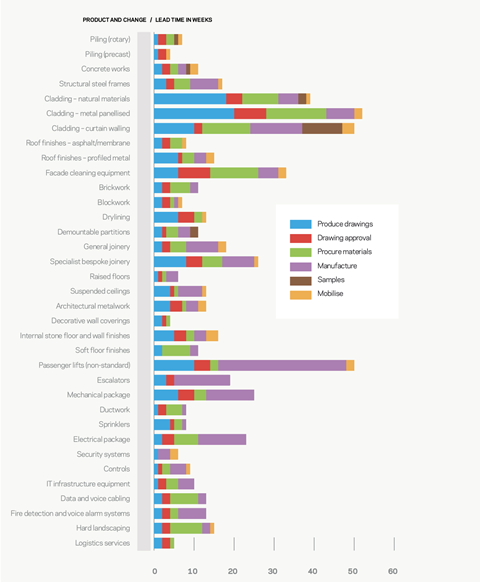No changes were seen in lead times this quarter, as availability issues with materials and labour caused by the pandemic were balanced out by falling demand related to Brexit. Brian Moone of Mace reports
01 / Staying level
▶ Rotary piling
▶ Precast piling
▶ Concrete works
▶ Concrete works
▶ Structural steel frames
▶ Cladding – reconstituted stone
▶ Cladding – natural materials
▶ Cladding – metal panellised
▶ Roof finishes – asphalt/membrane
▶ Roof finishes – profiled metal
▶ Facade cleaning equipment
▶ Brickwork
▶ Blockwork
▶ Drylining
▶ Demountable partitions
▶ General joinery
▶ Specialist joinery
▶ Raised floors
▶ Suspended ceilings
▶ Architectural metalwork
▶ Decorative wall coverings
▶ Internal stone floor and wall finishes
▶ Soft floor finishes
▶ Passenger lifts (non-standard)
▶ Escalators
▶ Electrical package
▶ Mechanical package
▶ Ductwork
▶ Controls
▶ Sprinklers
▶ Fire detection and voice alarm systems
▶ Security systems
▶ IT infrastructure equipment
▶ Data and voice cabling
▶ Hard landscaping
▶ Logistics services
02 / Lead times summary
Concrete works ▶ lead times remain at 11 weeks following a rise of one week last quarter; enquiry levels remain up but workload down compared with six months ago, so contractors do not anticipate a change in lead times over the next six months. Structural steel frames ▶ lead times remain at 17 weeks with workload and enquiry levels down over the past six months; no further changes are forecast.
Cladding – natural materials ▶ remain at 39 weeks, with workload level but enquiries down compared with six months ago. Increased lead times are anticipated due to the closure of manufacturing facilities. Cladding – metal panellised ▶ lead times remain at 52 weeks after increasing two weeks last quarter. Increases are expected over the next six months as some suppliers continue to report growing procurement periods and potential labour issues. Cladding – curtain walling ▶ lead times are 50 weeks; workload is up on six months ago but enquiries unchanged. Several firms anticipate lead times rising amid concerns over Brexit.
Roof finishes – asphalt/membrane ▶ lead times remain at eight weeks having increased by one week last quarter. Enquiries are lower than six months ago but with signs of workload levelling off. Problems with materials availability and labour restrictions show signs of improving. Roof finishes – profiled metal ▶ lead times remain at 15 weeks, despite workload and enquiry levels being lower. No change is expected.
Facade cleaning equipment ▶ lead times remain at 33 weeks; contractors are busier and enquiries up from six months ago, but no change is forecast.
Brickwork ▶ lead times remain at 11 weeks. Workload and enquiries are consistent so no change is anticipated despite concerns over labour and materials availability due to Brexit and coronavirus. Blockwork ▶ lead times remain at seven weeks and drylining ▶ at 13 weeks, with no changes forecast.
Demountable partitions ▶ remain at 11 weeks with lower workload and enquiry levels reported; lead times may rise due to materials shortages. General joinery ▶ lead times are 18 weeks, with workload and enquiries consistent and no issues with materials or labour. Specialist joinery ▶ lead times remain at 26 weeks; workload is down but enquiries are up. There are issues with availability of veneers out of Europe, but no increase in lead times is anticipated. Raised floors ▶ lead times remain at six weeks; workload and enquiries remain down, but no change to lead times is forecast in the next six months.
Architectural metalwork ▶ lead times remain at 13 weeks but may start to decrease as workload and enquiries are falling. Decorative wall coverings ▶ stick at four weeks with no change forecast. Internal stone floor and wall finishes ▶ remain at 16 weeks with no change expected enquiry levels and workload rising. Soft floor finishes ▶ remain at 11 weeks.
Passenger lifts (non-standard) ▶ lead times are 50 weeks but may rise in the next six months as firms anticipate covid will impact materials availability.
Electrical package ▶ lead times stay at 23 weeks following last quarter’s increase of three weeks, with no change anticipated over the next six months despite concerns over labour availability, particularly in London, due to large infrastructure projects and covid. Mechanical package ▶ lead times remain at 25 weeks. Workload and enquiry levels are mixed but no change is anticipated despite materials availability issues due to covid. Ductwork ▶ lead times remain at eight weeks, with no change forecast. Materials availability has been a problem but is resolving.
Controls ▶ remain at nine weeks with no change forecast as enquiries are stable despite workloads falling. Sprinklers ▶ remain at eight weeks; although workload and enquiry levels remain consistent, there are signs of an increase in lead times over the next six months. Fire detection and voice alarm systems ▶ remain at 13 weeks following a three-week increase last quarter. Workload is consistent but enquiries are down. Lead times are set to rise further in the wake of pandemic-related materials availability issues.
Logistics services ▶ remain at five weeks with no change expected; enquiries are stable but workload down and there is uncertainty over labour and materials availability due to covid.
Despite shortages in materials and restrictions on labour due to the impact of covid, lead times continue to remain resilient, with no packages reporting changes this quarter. Many companies have highlighted Brexit as a potential future challenge, but this is balanced out by reductions in future demand for work being reported.
For more details please visit www.macegroup.com/people/suppliers
























No comments yet